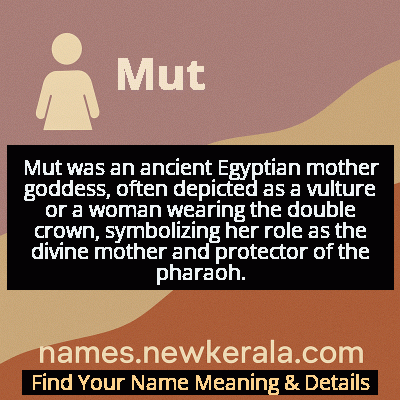Mut Name Meaning & Details
Origin, Popularity, Numerology Analysis & Name Meaning of Mut
Discover the origin, meaning, and cultural significance of the name MUT. Delve into its historical roots and explore the lasting impact it has had on communities and traditions.
Name
Mut
Gender
Female
Origin
Egyptian
Lucky Number
9
Meaning of the Name - Mut
Mut was an ancient Egyptian mother goddess, often depicted as a vulture or a woman wearing the double crown, symbolizing her role as the divine mother and protector of the pharaoh.
Mut - Complete Numerology Analysis
Your Numerology Number
Based on Pythagorean Numerology System
Ruling Planet
Mars
Positive Nature
Generous, passionate, energetic, and humanitarian.
Negative Traits
Impulsive, impatient, moody, and can be overly emotional.
Lucky Colours
Red, maroon, scarlet.
Lucky Days
Tuesday.
Lucky Stones
Red coral, garnet.
Harmony Numbers
1, 2, 3, 6.
Best Suited Professions
Military, sports, philanthropy, leadership roles.
What People Like About You
Courage, energy, leadership, generosity.
Famous People Named Mut
Mutemwiya
Ancient Egyptian Queen
Mother of Pharaoh Amenhotep III and key figure in 18th Dynasty royal lineage
Mutnodjmet
Ancient Egyptian Princess and Queen
Played crucial role in transition from Amarna period back to traditional Egyptian religion
Mutirdis
Ancient Egyptian Noblewoman
High-ranking priestess during 26th Dynasty known for extensive temple donations
Name Variations & International Equivalents
Click on blue names to explore their detailed meanings. Gray names with will be available soon.
Cultural & Historical Significance
During the reign of female pharaoh Hatshepsut, Mut's worship was particularly emphasized as the queen sought to legitimize her rule through divine maternal symbolism. Mut was often syncretized with other goddesses, most notably Sekhmet, creating a powerful composite deity that embodied both nurturing motherhood and fierce protection. This dual nature made her particularly appealing to rulers who needed to demonstrate both compassionate governance and military strength. Annual festivals like the Beautiful Feast of the Valley featured processions where Mut's statue was carried through Thebes, allowing common people to seek her blessings and protection. Her enduring worship demonstrates how maternal divine figures provided stability and continuity throughout Egypt's long history, adapting to political changes while maintaining core symbolic meanings.
Extended Personality Analysis
Those named Mut typically embody a remarkable balance of gentle nurturing and formidable strength, reflecting the goddess's dual nature as both compassionate mother and protective lioness. They often serve as the emotional center of their families and communities, providing unwavering support and wisdom gained through life experience. Their protective instincts are strong but tempered with deep empathy, making them both reliable defenders and understanding counselors. These individuals tend to be highly intuitive, often understanding situations and people on a profound level that others might miss. They possess natural authority that doesn't need to be demanded but is naturally accorded to them by others who recognize their wisdom and integrity.
In professional and social settings, people named Mut often become the 'glue' that holds groups together, using their organizational skills and emotional intelligence to maintain harmony and productivity. They're not afraid to take charge when necessary but prefer to lead through consensus and mutual respect. Their strength lies in their ability to adapt to different situations—they can be gentle and accommodating when circumstances call for diplomacy, yet firm and decisive when facing challenges or threats to their loved ones or principles. This adaptability, combined with their deep sense of responsibility toward those in their care, makes them exceptionally resilient individuals who can weather life's storms while providing shelter for others. Their legacy is often built through quiet, consistent support rather than dramatic achievements, though their influence runs deep and lasting in the lives they touch.
Modern Usage & Popularity
In contemporary naming practices, Mut remains a highly specialized choice, primarily embraced by Egyptology enthusiasts, historians, and families with strong connections to ancient Egyptian heritage. While extremely rare in general population statistics, the name has maintained a consistent, though minimal, presence in academic and cultural circles. Its usage peaked slightly during the early 20th century Egyptology boom and again during the 1970s when goddess spirituality movements gained popularity. Modern parents who choose this name are typically seeking something deeply meaningful, historically significant, and powerfully feminine without being overtly trendy. The name's brevity and distinctive sound make it memorable, while its connection to maternal strength and protection appeals to those valuing these qualities. In Egypt itself, the ancient name has largely been replaced by Arabic names with similar meanings, though it occasionally appears in compound names or among Coptic Christian families preserving pharaonic heritage. The name's rarity ensures that bearers stand out, while its profound historical and symbolic weight provides a rich personal narrative for those who carry it.
Symbolic & Spiritual Meanings
Symbolically, Mut represents the complete cycle of creation, protection, and transformation that defines the maternal archetype across cultures. As the mother goddess who gave birth to the world, she embodies the creative power that brings forth life from nothingness. Her vulture form symbolizes the transformation of death into new life, representing the eternal cycle of existence and the mother's role in both nurturing life and processing loss. The double crown she wears signifies not just royal authority but the integration of opposing forces—Upper and Lower Egypt, heaven and earth, compassion and strength. This makes her a powerful symbol of wholeness and balance. Her association with the sacred lake connects her to emotional depth, intuition, and the subconscious—the watery realms from which wisdom emerges. In psychological terms, Mut represents the integrated feminine that embraces both gentle nurturing and fierce protection, rejecting artificial divisions between 'soft' and 'strong' feminine qualities. For modern spiritual seekers, she symbolizes the reclaiming of ancient feminine wisdom and the power that comes from embracing one's complete nature without compromise or apology.

